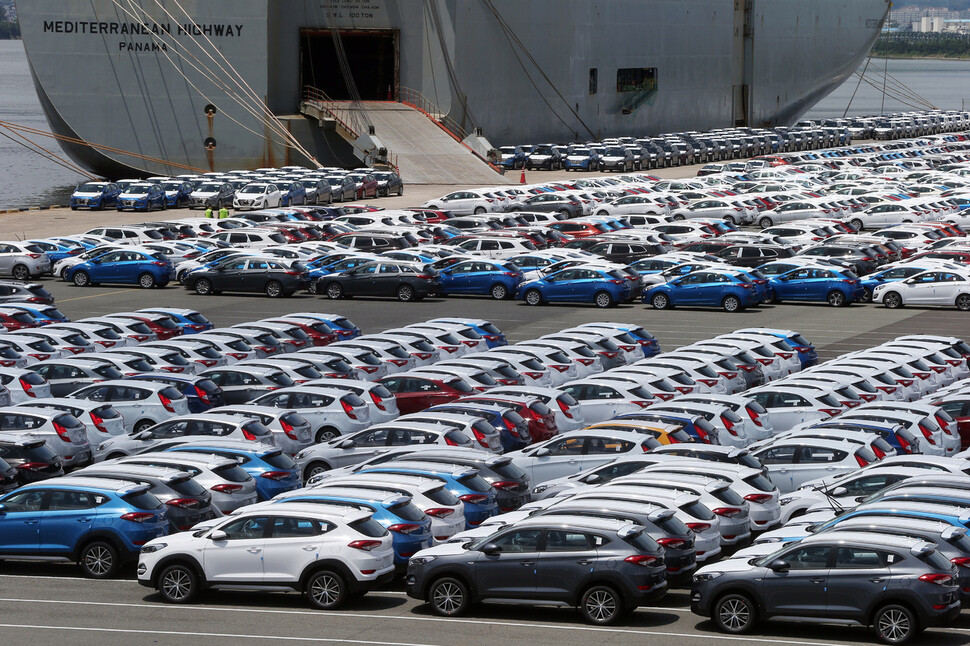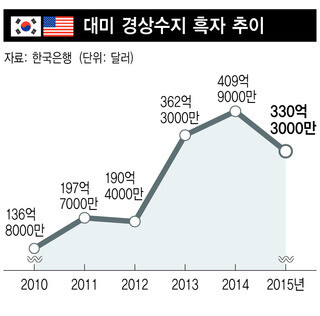hankyoreh
Links to other country sites 다른 나라 사이트 링크
[Editorial] The need for an effective response to Trump’s “America First” policies

The global trade order is being rocked by US President Donald Trump’s open advocacy of an “America first” approach. Countries that depend heavily on exports are unlikely to avoid some kind of direct or indirect blow. Trade frictions between Washington and Beijing are also very likely to hurt the South Korean economy; China in particular has been ratcheting up various non-tariff barriers against it to protest its Terminal High Altitude Area Defense (THAAD) deployment decision. With growth conditions persisting below the 3% line amid weak domestic demand, a decline in export conditions too is a serious problem. So it’s exasperating to see how the government plans to respond. Its vague and unrealistic ideas are only adding to the anxieties of economic actors.

On Jan. 26, the South Korean government had a meeting of economic ministers and announced plans to consider expanded imports for US cars and aircraft. South Korea does have a large trade surplus with the US, but it’s inappropriate to increase imports without considering the economic feasibility of it. The Ministry of Trade, Industry and Energy has said it has not considered an expansion of car imports, which suggests things aren’t even being properly coordinated between agencies. It’s also embarrassing to hear they invited US Congressional aides to visit South Korea. Do they expect that to offer some serious kind of support?
The ideas for responding to Beijing’s actions are also a lot of talk with little substance. The plan apparently involves taking full advantage of bilateral channels (including meetings between the South Korean and Chinese economic ministers) and institutions like the World Trade Organization and increasing cooperation between government missions in China to coordinate on a response with major countries that are experiencing similar problems. The message seems to be, “Well, we’ll give things a try, anyway.” The seriousness of the situation lies in how Seoul appears to be willfully ignoring reality. China’s actions are clearly meant to be retaliation for the THAAD deployment decision, yet Seoul has simply said it can’t undertake any official response because “it’s not clear that this is retaliatory action.”
Trade negotiations are unlikely to produce only the things we want. We need to make balanced interests our goal and proceed with an assertive and judicious response. With President Park Geun-hye now impeached, Seoul has failed to keep up with the changes with its outdated diplomatic and trade policy. Her likely successors at least need to offer solutions for this serious problem and figure out how to get the public on board.
Please direct questions or comments to [english@hani.co.kr]

Editorial・opinion
![[Guest essay] The real reason Korea’s new right wants to dub Rhee a founding father [Guest essay] The real reason Korea’s new right wants to dub Rhee a founding father](https://flexible.img.hani.co.kr/flexible/normal/500/300/imgdb/original/2024/0423/8317138574257878.jpg) [Guest essay] The real reason Korea’s new right wants to dub Rhee a founding father
[Guest essay] The real reason Korea’s new right wants to dub Rhee a founding father![[Column] ‘Choson’: Is it time we start referring to N. Korea in its own terms? [Column] ‘Choson’: Is it time we start referring to N. Korea in its own terms?](https://flexible.img.hani.co.kr/flexible/normal/500/300/imgdb/original/2024/0423/3617138579390322.jpg) [Column] ‘Choson’: Is it time we start referring to N. Korea in its own terms?
[Column] ‘Choson’: Is it time we start referring to N. Korea in its own terms?- [Editorial] Japan’s rewriting of history with Korea has gone too far
- [Column] The president’s questionable capacity for dialogue
- [Column] Are chaebol firms just pizza pies for families to divvy up as they please?
- [Column] Has Korea, too, crossed the Rubicon on China?
- [Correspondent’s column] In Japan’s alliance with US, echoes of its past alliances with UK
- [Editorial] Does Yoon think the Korean public is wrong?
- [Editorial] As it bolsters its alliance with US, Japan must be accountable for past
- [Guest essay] Amending the Constitution is Yoon’s key to leaving office in public’s good graces
Most viewed articles
- 1Samsung barricades office as unionized workers strike for better conditions
- 2[Editorial] Japan’s rewriting of history with Korea has gone too far
- 3[Column] The clock is ticking for Korea’s first lady
- 4[Column] The president’s questionable capacity for dialogue
- 5[Reporter’s notebook] Did playing favorites with US, Japan fail to earn Yoon a G7 summit invite?
- 6Korean government’s compromise plan for medical reform swiftly rejected by doctors
- 7Why Korea shouldn’t welcome Japan’s newly beefed up defense cooperation with US
- 8Senior doctors cut hours, prepare to resign as government refuses to scrap medical reform plan
- 9[Column] ‘Choson’: Is it time we start referring to N. Korea in its own terms?
- 10[Guest essay] The real reason Korea’s new right wants to dub Rhee a founding father